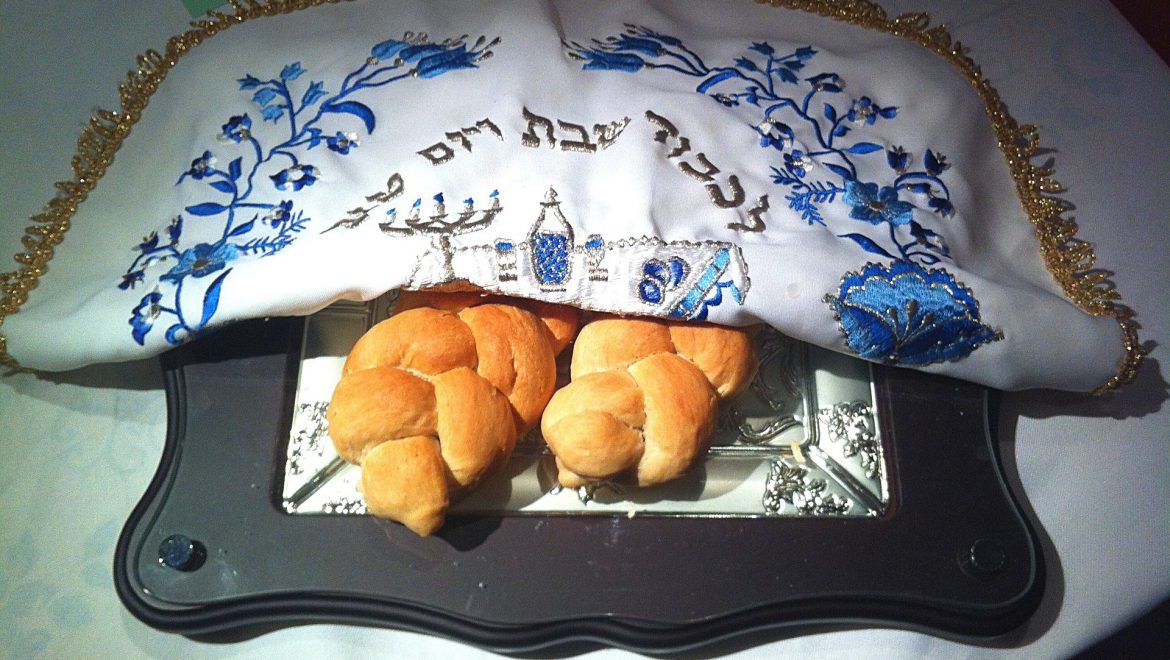
Shared in “A Meal With A Feel,” Onward Israel’s educational pamphlet designed to transform Shabbat dinner into a meaningful experience for all, this post provides an introduction to some of the basic Shabbat evening rituals and songs.
Basic Shabbat Concepts for Friday Night
A few basic concepts and customs that help differentiate the Friday night meal from our weekly eating. In Hebrew, we typically talk about “Seudat Shabbat” – סעודת שבת (the Shabbat banquet) as compared to a typical weekly meal – “arucha” – ארוחה.
- What kind of experience do you imagine when you think about “a meal” as compared when you picture in your mind’s eye “a banquet?”
- Appearance? Tastes? Smells? Even how people might be dressed?
- Ask yourself and your friends – how can we turn our “arucha– ארוחה” into a “seudah – סעודה?”
Kabbalat Shabbat – קבלת שבת
Before enjoying the Friday night banquet, it is traditional to include a series of special prayers and songs as an opening to the Friday night prayer service. Many of the prayers and songs included are unique to Friday night and emphasize the central place of the Shabbat in Jewish life and in the covenant between the Jewish people and the Divine.
Probably the most famous of these prayers and songs is “Lecha Dodi – לך דודי.” Written by the Jewish mystic Rabbi Shlomi HaLevi Alkabets (16th century) in the Galilean city of Tzfat, the song presents Shabbat as a bride with the chorus:
Lecha Dodi L’krat Kala Pnei Shabbat N’Kabala…
לך דודי לקראת קלה פני שבת נקבלה
Let us go out my beloved to welcome the bride – to receive the Sabbath’s face…
In communities all around the world, it is customary to sing this song, to rise at its closing lines, and turn away from the front of the synagogue, to open the doors wide, and bow to bring in the Shabbat as a beloved queen and guest.
In communities all around the world, there are different tunes for Lecha Dodi. Take a look on Youtube to listen to the countless versions, or check out some tunes here. Learn and share your favorite version at your Shabbat table. Take a tune that you particularly love and start your own tradition.
Shalom Aleichem – שלום עליכם
Another song shared worldwide by Jews across communities and times is Shalom Aleichem – שלום עליכם. Typically sung at the beginning of the Friday evening feast, it welcomes the angels that Jewish tradition identifies as the Divine’s sacred entourage to our Shabbat table. In some traditions, people stand in song.
Shalom Aleichem malchei hasharet malchei elyon mi melech malkei hamelakhim HaKadosh Baruch Hoo…
שלום עליכם מלכי השרת מלכי עליון מי מלך מלכי המלכים הקדוש ברוך הוא…
Peace unto you the angelic entourage who serves the Supreme King. Who is the King of Kings? The Holy One Blessed Be…
Shalom Aleichem – שלום עליכם is also sung throughout the Jewish world with countless tunes. Search on Youtube to hear tunes from Yemen, from Poland, from the USA, and from modern Israel. Share your favorites and again – try your own favorite tunes.
Kiddush – קידוש
Jewish ceremony and sacred moments are typically consecrated with a blessing over a goblet of wine. Throughout the ancient world, and particularly in the Ancient Mediterranean and Middle East, grapes and wine were seen as sacred bounty, as a sign of celebration, and a hope that prosperity, happiness, and peace will always be our bounty.
HaMotzi Lechem – המוציא לחם
Observant Jews will mark the beginning of any meal with a blessing over bread. Bread – and wheat – were signs of civilization, and were the most central element of the human diet. At the Friday night table, two loaves of bread grace the table. It has become tradition that braided, egg washed, golden bread – either round or elongated – is the special bread for the Sabbat table: “challah – חלה.”
Two challot are reminders of the food from heaven that the Bible recounts as having been the Divine’s gift to the wandering Jewish people in the desert on the day before Shabbat. It also is a memory of the Temples in Jerusalem and the double sacrifice presented on the Sabbath.
It may also be a reminder to us that food is not to be taken for granted. Ceremonial moments create delay… anticipation… and maybe also appreciation. Food is a sacred thing. Most people in the world do not have the resources that we often take for granted. It could be that our rituals are also a hint to recall those who are less fortunate than we are, who need our assistance so all humans can be blessed with the food that is essential to our shared survival.

